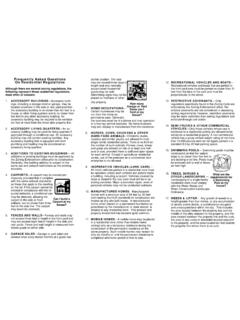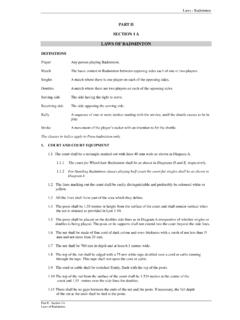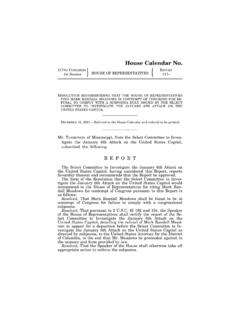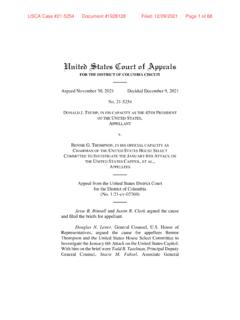Transcription of AFRICA PROGRAM OCCASIONAL PAPER
1 T he world is currently struggling to control a global public health pandemic COVID-19 that is spreading very fast with diverse levels of fatalities in different regions and countries. Starting in Wuhan, China in late 2019, COVID-19 has become a global epidemic within a very short time. At the moment, Europe especially Italy, Spain, the UK, and France and the have been hardest hit in terms of infections and fatalities despite their more sophisticated health service delivery systems. This has raised great concern for the African continent due to the continent s relatively weak health systems compared to Europe and the Global North, and the wide expanse of areas on the continent with no health services or systems in PAPER addresses the South African government s response to COVID-19 and the impact of the disease on South African society. The country announced its first case of COVID-19 on March 5, 2020. By March 15, 2020, the number of cases had risen to 61.
2 President Cyril Ramaphosa then declared a national state of disaster and announced a number of measures to be undertaken to contain the spread of the virus. These measures, detailed in figure 1 below,1 are continuously being reviewed by the government with the aim of responding as effectively as possible to the fast-evolving For example, since the measures were first announced, the number of people allowed to gather in one location has been reduced from 100 to 50. Several governance structures were quickly put in place to manage the spread of this disease, including an Inter-ministerial committee on COVID-19, an Emergency Operations Center, and a National Command Council chaired by the president himself. Still, by March 23, 2020, the number of infections had increased from 274 to 402. The president, in collaboration with the National Command Council, declared a 21-day national lockdown The Impact of COVID-19 in South AfricaBy Dr.
3 Emmanuel Sekyere, Prof. Narnia Bohler-Muller, Prof. Charles Hongoro, and Dr. Mokhantso Makoae April 2020 AFRICA PROGRAM OCCASIONAL PAPER2 | Wilson Center - AFRICA ProgramFigure 1commencing on March 26, 2020 to help curb the spread of the disease and minimize its impact on South African society. As of April 16, 2020, South AFRICA had recorded 2,506 confirmed infections, 34 deaths, and 410 Hence, restricting the movement of people, practicing social distancing, and tracing all those who have been in contact with an infected person (all of which are being practiced globally to varying degrees) appear to be effective ways of controlling the spread of the disease. Several coronavirus helplines have also been established for immediate response from the police, health service, rapid response to crime, fire service, and other service delivery needs of society.
4 The COVID-19 epidemic has several diverse implications and impacts on South African society including in the social, economic, health, environmental, and technological Dimensions The government-mandated lockdown has restricted movement of people with the exception of those who work in essential services such as police, health, fire, army, pharmacies, supermarkets, and transportation 2 | Wilson Center - AFRICA Program3 | Wilson Center - AFRICA Programand, more recently, informal food trading. Everyone else is required to stay indoors except on the rare occasions that they need to seek medical help, buy groceries from supermarkets, or medication from pharmacies. Moreover, these outlets are also required to ensure that no more than 50 people are on their premises at any given time. The social distancing policy has led to the suspension of all religious gatherings, schooling, and social-cultural functions. Homeless people have been relocated into temporary shelter that is well spaced out.
5 However, there are strong challenges that emerge from the lockdown and the social distancing policy. South AFRICA has a serious challenge with gender-based violence (GBV) and violence towards children. 8,700 cases of GBV were reported from March 26, 2020, when the lockdown began, to April 3, Another challenge relates to drinking. Alcohol sales and consumption have been prohibited in order to minimize intoxication and the resulting social aggravations and conflict among people stuck together during the lockdown, especially in dysfunctional homes and incohesive or crime-ridden communities. However, despite the societal discomfort that this has caused (particularly as it relates to alcohol and other addictions), the minister overseeing the police reported that the lockdown and restrictions on alcohol sales and consumption have reduced other types of crime in South AFRICA . Another challenge relates to the rural, peri-urban, or informal dwellings where closely-located shacks and the absence of clearly laid out infrastructure makes social distancing impossible.
6 For those living in overcrowded shacks, staying outside seems healthier than being indoors. Thus, localities with crowded and informal dwellings have a lot of people outside, only to encounter police and army patrols enforcing stay-indoor orders. Consequently, there are growing tensions between society and the army, which has been called in to supplement the efforts of the police in enforcing the lockdown. For example, several social media videos have emerged showing civilians found defying the lockdown order being forced through military-style drills by security personnel. Economic ImplicationsThe already high levels of poverty in South AFRICA have been aggravated by the stay-at-home orders which mean no economic activity and, therefore, no income-earning opportunities, especially for the self-employed and the informal sector (which consists mostly of small and medium scale enterprises). Consequently, society is already beginning to agitate for easing of the lockdown policy.
7 Initially, buses and mini-buses, locally called kombi, were allowed to board only a minimum number of passengers in order to comply with social distancing requirements, and operate only for limited hours to transport essential personnel. However, this made the transport business unprofitable. The resulting hardships for operators and passengers alike led to revised regulations that now allow mini-buses to board up to 70 percent of their capacity, while also requiring everyone to wear The South African economy was technically already in a recession prior to the lockdown. The formal productive sector is now under tremendous additional pressure from the coronavirus response measures. For example, the expenditure required to mitigate the spread of the pandemic such as for testing equipment and implementing control measures, relocating and caring for the homeless, conducting contact-tracing, and treating the infected will place an extra burden on the national treasury which was already severely constrained by repeated bailouts of poorly performing state-owned enterprises.
8 The Reserve Bank of South AFRICA has responded to the crisis with a 100 basis-point reduction in the prime interest rates. This, in turn, will lead to a reduction in short-term interest rates in order to make the servicing of existing debt more affordable to debtors, whether households or Banks and other financial 4 | Wilson Center - AFRICA Programinstitutions are offering three-month payment holidays for debt and credit cards to allow households and firms to adjust during and immediately after the lockdown. Other financial institutions are suggesting that consumers file claims with their credit life insurance policies to cover loans that they are otherwise unable to pay. However, to date, other financial commitments such as rent payments have not been temporarily suspended. Further compounding the economic situation and outlook, Moody s recently downgraded South AFRICA s sovereign credit rating to junk state (Ba1 with a negative outlook),7 the timing of which was considered as insensitive by many in South AFRICA .
9 This downgrade has led to South AFRICA s removal from the Global Bond Index and will increase South AFRICA s cost of borrowing in international financial markets. As a result, the South African Rand (SAR) has depreciated significantly against major currencies, , from R15 to USD$1 to to the South AFRICA s ability to rally out of this dire economic situation post-COVID-19 will be a significant challenge and will also depend on how well the global economy as a whole and Environmental DimensionsThere will be additional pressure on health facilities as more infections emerge, should the lockdown continue and current mitigation measures fail to curb the spread of the virus. Testing equipment and centers are being increased and isolation centers are being created to help isolate the infected. The demand for intensive care beds and ventilators is likely to increase as more people become infected. Frequent washing of hands, staying hydrated, staying indoors, avoiding handshakes and body contact, and practicing good personal hygiene have been recommended as useful measures for curbing the spread of the virus.
10 All these are being practiced as best as possible by South Africans. However, there are larger health and environmental challenges beyond the control of the individual. First is the poor water and sanitation facilities in some communities. South AFRICA is a water-scarce country in which some communities lack access to clean water. In addition, sanitation facilities are in a deplorable state in many townships, with many households often having to share highly deficient facilities. Moreover, littering in some communities, coupled with poor waste pickup service, creates unhygienic environments. In general, these poor sanitation conditions facilitate the spread of diseases. All of these factors taken together make practicing good hygiene, frequent washing of hands, and staying hydrated a significant challenge for those South Africans who have access only to contaminated or otherwise poor quality water. Technology DimensionsTechnology has also played a double-edged role in the outbreak and control of this pandemic.







